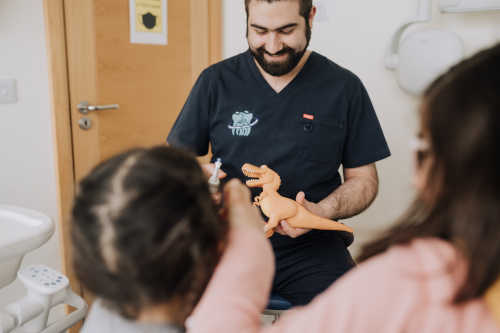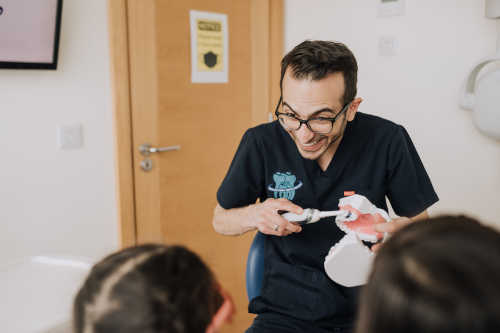It's never too early to start caring for your smile.
At Roscam Family Dental Practice we believe that starting your little ones on their smile journey from a young age helps set good habits for life. When it comes to our younger patients we believe that prevention is one of the best cures and ensure that education regarding dental care and oral hygiene is a key component of our treatment plan.
Just like adults, children should have regular dental examinations and cleanings.
All children should ideally have their first dental check-up before the age of 2.
This means that not only is your dentist able to make sure that their smile is healthy, but it also means that your child has the advantage of establishing good dental habits from an early age.
An added bonus is that they get used to visiting the dentist before there is a problem and that any developing issues can be caught early before they have an opportunity to cause pain or discomfort.


Fissure Sealants are thin coatings that are painted onto the surfaces of the back teeth that are involved in the chewing of food. The most important function of fissure sealants is to help prevent tooth decay. Although fluoride in toothpaste and drinking water help to protect the smooth surfaces of the teeth, in certain cases, the back teeth may require further protection. The surfaces on the back teeth responsible for chewing are rough and uneven because they have many small pits and grooves naturally. Food and plaque bacteria can get trapped in these pits and grooves. Because these areas can be hard to reach with a toothbrush and the toothbrush bristles cannot always brush them away, these areas can be particularly prone to decay.
Treating teeth with fissure sealants is a quick, simple and painless procedure that involves painting on the sealant in a liquid form. This liquid then quickly hardens once activated by a special light to form a shield over the tooth.
Fissure sealants have been shown to be incredibly helpful in helping to reduce tooth decay in children by protecting the enamel of the teeth in conjunction with a solid oral hygiene routine.
As soon as they appear!
Once your baby’s teeth are up they will need gentle cleaning to keep them clean and healthy.
It’s also really important to get children into the habit of having their teeth cleaned regularly from a young age.
The first baby teeth can be cleaned using a soft baby toothbrush and water (no toothpaste!) or even a clean cloth or piece of gauze.
If you have questions about how to care for your child’s smile contact your dentist and they will not only be able to answer your questions but also give you helpful hints and techniques when it comes to caring for your child’s smile.
All children should visit the dentist before their 2nd birthday.
Regular dental visits from a young age mean that not only are they familiar with the dental chair but that they don’t worry about visiting the dentist!
It’s also an opportunity to familiarise them with the noises, sounds and equipment found in a dental practice.
Most importantly, however, regular dental visits for young children are an investment in their smile and dental health for years to come.
It’s really important to get children into the habit of visiting the dentist before tooth decay or dental pain sets in so that they can have a positive experience that benefits their smile!
While every child is different, here are a few tips to help prepare your child for their first dental visit.
Try to book the appointment at a time when your child would usually be in good form (where possible avoid booking appointments during nap time etc.).
You can read children’s books about visiting the dentist or play “going to the dentist” where you count teeth and practice opening the mouth wide.
There is no need or benefit in going into too much detail about what a dental visit involves.
Your dentist will explain what your child needs to know in a simple way at the appointment and provide the opportunity for you to ask any questions you may have as well once the initial assessment has been completed.
A simple way of explaining it to your child is that the dentist is someone who helps look after our teeth so that we can smile more!
If you have specific concerns it is a good idea to mention them when making the appointment so that this information can be passed on to your dentist in advance of your child’s visit.
If a tooth is knocked out, seek dental assistance immediately.
It’s important to try locate the knocked out tooth as quickly as possible and to get both you and the tooth to the dentist!
Don’t touch the root of the tooth and try to only hold the tooth by the crown (top part of the tooth).
Place the tooth in a small container of milk or saliva to keep the tooth covered and stop it from drying out on the way to your dentist.
Do NOT:
-Soak the tooth in water or scrub it
-Handle the tooth other than getting it into the container
-Wrap the tooth in a tissue or cloth or anything dry
-Re-implant the tooth in the mouth
The faster you can get to your dentist the better the chances of the tooth surviving.
The short answer to this question is YES!
The slightly longer answer is Yes because it’s vital to ensure that there is no trauma or damage to any part of the teeth or supporting structures (especially under the gumline).
Just because you can’t see any damage doesn’t mean that there isn’t any damage to your child’s teeth.
Trauma to the mouth can cause cracks in the teeth or that over time can expose the tooth to bacteria and decay.
It’s also essential to ensure that there is no damage that could potentially affect the permanent teeth developing under the gums in younger children.
An emergency dental appointment means that your dentist will be able to examine the teeth and take any necessary X-rays and/or images to assess any damage and provide you with a plan to help manage any pain while safeguarding your child’s smile.
Tooth discolouration can occur in children for a number of reasons including but not limited to trauma, decay and certain medications.
It’s really important to get your child a full dental examination so that the cause of the discolouration can be determined as well as the best solution for your child’s smile.
In a word, Yes!
One of the most common misconceptions about baby teeth is that they are unimportant or do not matter because they are going to eventually fallout.
This is absolutely false.
Baby teeth need care and attention to keep them healthy and free from decay since baby teeth can be slightly weaker, and decay can set in faster and spread into the tooth faster.
If there is decay in the tooth and it is left untreated, not only will the baby tooth be damaged and potentially cause your child pain, the other risk is that the decay can potentially damage the permanent teeth growing and developing under the gums.
© 2025 Roscam Family Dental Practice | All Rights Reserved
Website designed and created by Vision Digital 
© 2025 Roscam Family Dental Practice
All Rights Reserved
Website designed and created by Vision Digital 
| Cookie | Duration | Description |
|---|---|---|
| cookielawinfo-checkbox-advertisement | 1 year | This cookie is used to record the user consent for the cookies in the "Advertisement" category . |
| cookielawinfo-checkbox-analytics | 1 year | This cookie is used to record the user consent for the cookies in the "Analytics" category . |
| cookielawinfo-checkbox-necessary | session | This cookie is used to record the user consent for the cookies in the "Necessary" category . |
| CookieLawInfoConsent | 1 year | Records the default button state of the corresponding category & the status of CCPA. It works only in coordination with the primary cookie. |
| elementor | never | This cookie is used by the website's theme. It allows the website owner to implement or change the website's content in real-time. |
| Cookie | Duration | Description |
|---|---|---|
| VISITOR_INFO1_LIVE | 5 months 27 days | A cookie set by YouTube to measure bandwidth that determines whether the user gets the new or old player interface. |
| YSC | session | YSC cookie is set by Youtube and is used to track the views of embedded videos on Youtube pages. |
| Cookie | Duration | Description |
|---|---|---|
| CONSENT | 2 years | YouTube sets this cookie via embedded youtube-videos and registers anonymous statistical data. |